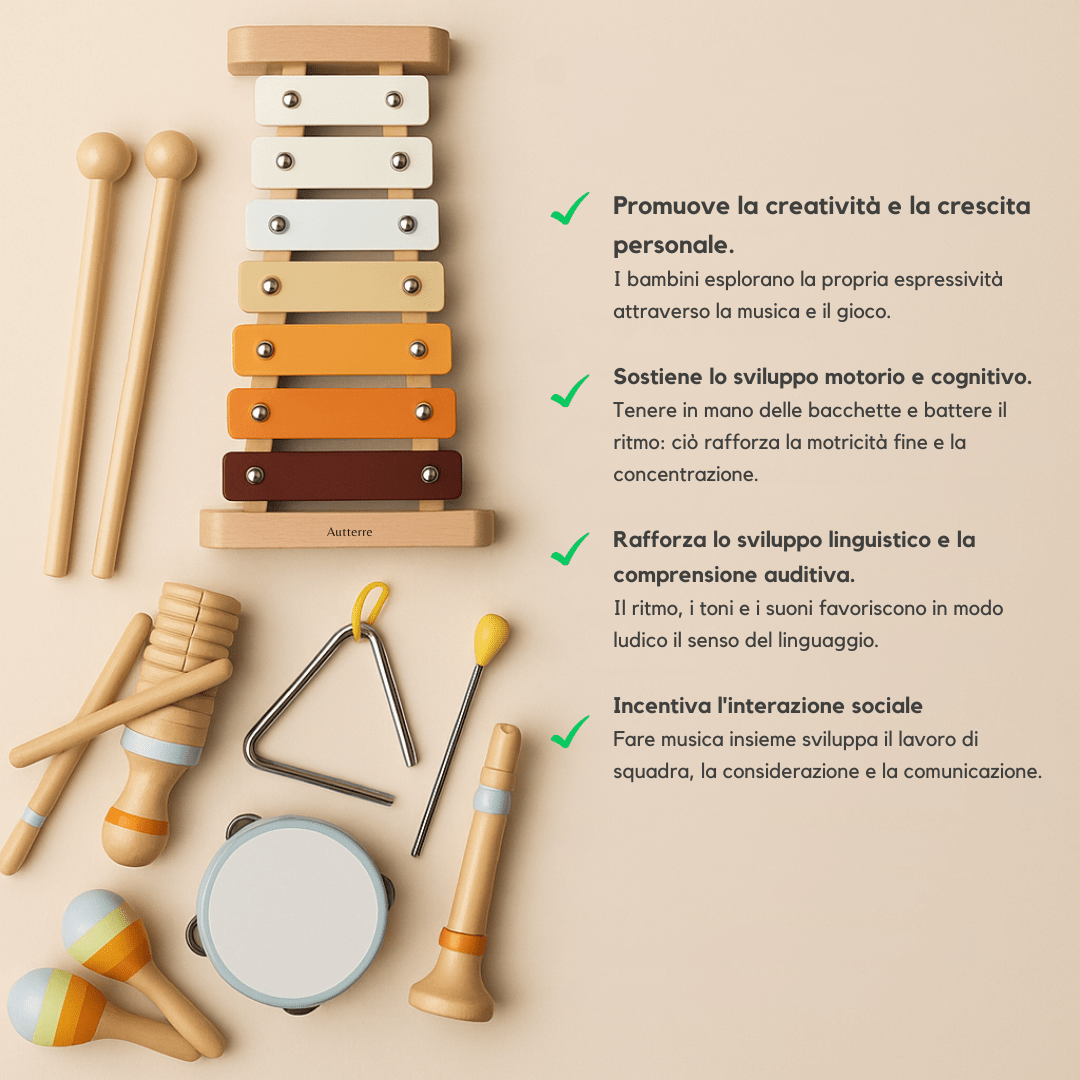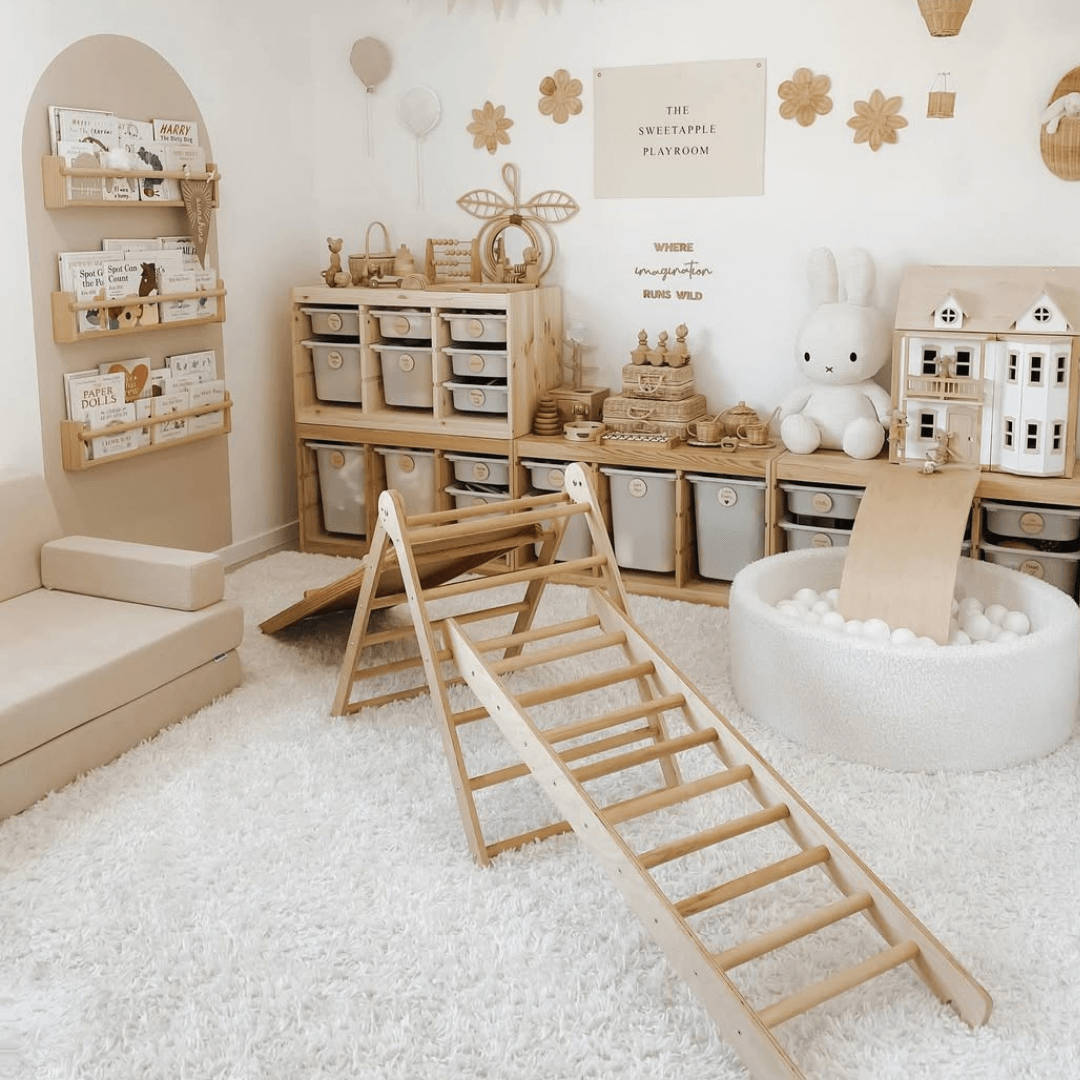



Sensory and cognitive development

Safe and natural materials

Educational but also fun
FAQ

Che cos'è il metodo Montessori?
The Montessori method is a revolutionary educational approach developed by Maria Montessori in the early 1900s. Based on self-learning and respect for the natural development of the child, this method is now adopted throughout the world.
Origins and Fundamental Principles
Maria Montessori, an Italian physician and educator, developed an educational system that focuses on independent learning, the manipulation of sensorial materials, and an environment designed to stimulate curiosity.
Why Choose the Montessori Method?
- Promotes autonomy
- Promotes concentration
- Respect the child's learning times
- Encourages cooperation and respect
The Montessori method is more than just an educational system: it is a philosophy that can positively influence a child's growth and development, making him or her more independent and motivated.
Quali sono i principi fondamentali del metodo Montessori?
The Montessori method is based on some key principles that guide the child's learning and development.
Key Principles
- Respect for the child – Each child is seen as an individual with his or her own learning pace.
- Prepared environment – Spaces must be organized to encourage autonomy and exploration.
- Self-learning – Children choose their activities and learn through discovery.
- Sensory Materials – Educational tools are designed to stimulate the senses and facilitate learning.
- Freedom with Limits – Children are free to explore but within clear and well-defined rules.
These principles make the Montessori method an innovative and respectful educational approach to the child, promoting their harmonious growth.
Qual è la differenza tra il metodo Montessori e l’educazione tradizionale?
Many parents wonder what the main differences are between the Montessori method and traditional education.
Montessori vs. Traditional Education
| Characteristic | Montessori Method | Traditional Education |
|---|---|---|
| Role of the teacher | Guide and observer | Leader and transmitter of knowledge |
| Learning | Self-directed | Based on frontal lessons |
| Teaching materials | Sensory and manipulative | Books and notebooks |
| Assessment | Individual observation | Grades and tests |
The Montessori method offers an alternative to traditional education, placing the child at the center of learning and promoting autonomy and creativity.
A quale età è indicato il metodo Montessori?
The Montessori method can be applied in different age groups, from birth to adolescence.
The Stages of Montessori Education
- 0-3 years : Sensory development, motor skills and autonomy.
- 3-6 years : Practical learning and language development.
- 6-12 years : Deepening knowledge and group work.
- 12-18 years : Development of independence and critical thinking.
There is no perfect age to start the Montessori method: every child can benefit from this approach at every stage of their growth.
Quali sono i vantaggi del metodo Montessori?
The Montessori method offers numerous benefits for child development.
Main Advantages
- Stimulates autonomy
- Promotes creativity
- Promotes hands-on learning
- Helps develop concentration
Adopting the Montessori method means providing children with the tools to become independent and self-confident individuals.
Quali materiali vengono utilizzati nei giochi Montessori?
The Montessori method is based on learning through direct and sensorial experience. The materials used in Montessori games are designed to be simple, functional and suitable for the child's development. But what are the most common materials and why are they chosen? In this guide we will explore the most used materials in Montessori games and their benefits.
Characteristics of Montessori materials
Montessori materials are designed to meet specific criteria that promote child development:
- Natural : They prefer wood, cotton, metal and other natural materials over plastic.
- Sensory : They help develop the child's senses, through different textures, weights and colors.
- Self-correcting : They allow the child to understand independently if he has made a mistake, without the need for adult intervention.
- Simple and attractive : They have neutral colors and essential shapes so as not to overstimulate the child.
- Structured for progressive learning : Each material introduces a new skill or concept, preparing the child for the next levels of learning.
Most common materials in Montessori games
1. Wood
Wood is the most used material in Montessori toys because it is natural, durable and pleasant to the touch. It is used in puzzles, ring towers, stacking cubes and objects for symbolic play.
2. Metal
Some Montessori toys, such as sandpaper letters and practical life frames, use metal to offer a different tactile sensation and greater resistance over time.
3. Fabric and felt
Textile materials are used to create games that promote fine motor skills, such as buttoning frames, sensory bags and play mats.
4. Glass and ceramics
Although it may seem unusual, the Montessori method encourages the use of fragile materials to teach children about gentleness and responsibility. Plates, glasses, and glass pitchers are often present in practical life activities.
5. Paper and cardboard
Used for creative activities such as drawing, cutting and making tactile books, these materials allow children to experiment with different shapes and textures.
Why choose natural materials in Montessori games?
The use of natural materials in Montessori games has several benefits:
- Sensory development : The child learns to recognize different weights, temperatures and textures.
- Greater durability and safety : Natural materials are more resistant and, if not treated with toxic substances, safer than plastic.
- Respect for the environment : The use of wood, cotton and other eco-sustainable materials reduces the environmental impact.
How to Choose the Best Montessori Toys for Your Child
When purchasing a Montessori toy, consider the following aspects:
- Age of the child : Games must be appropriate for the developmental stage.
- Child's Interest : Observe what attracts him most.
- Quality Materials : Make sure they are safe, non-toxic and durable.
- Autonomy : It must allow the child to explore and learn without the constant intervention of an adult.
The materials used in Montessori games are carefully chosen to promote sensory and hands-on learning. Choosing natural materials such as wood, fabric and metal helps develop cognitive and motor skills in children, respecting their growth rate. If you are looking for educational games for your child, choose carefully and prefer high-quality materials for an authentic and stimulating learning experience.
Consegna e reso
Sì ,spediamo i nostri prodotti in molti paesi internazionali.
SPEDIZIONI
GRATIS con per ordini superiori a 29€ con ricezione entro 3- 10 giorni lavorativi . Scopri i dettagli sulle spedizioni 5€ su ordini inferiori o uguali a 29€ .
RESI
Reso: Hai 30 giorni di tempo per esercitare il diritto di recesso dalla data di ricezione della merce ed ottenere il rimborso dei prodotti restituiti.
Dov'è il mio Pacco
Clicca QUI per tracciare il tuo ordine
Qual è la vostra politica di rimborso?
Desideriamo che tu sia soddisfatto del tuo acquisto, ma se non lo sei, ecco come funziona il rimborso:
- Resi accettati: Puoi restituire i prodotti entro 30 giorni dalla consegna, purché siano inutilizzati, integri e nella confezione originale.
- Come avviare un reso: Contatta il nostro servizio clienti via email o attraverso il modulo sul nostro sito, specificando il numero d’ordine e il motivo del reso.
- Rimborsi: Una volta ricevuto e controllato il prodotto, emetteremo un rimborso sul metodo di pagamento originale entro 5-7 giorni lavorativi. Le spese di spedizione per il reso, se non dovute a difetti del prodotto, sono a carico del cliente.
Cosa succede se ricevo un prodotto difettoso o sbagliato?
Ci scusiamo per qualsiasi inconveniente! In caso di prodotti difettosi o errati:
- Contattaci entro 30 giorni dalla consegna con foto del prodotto ricevuto.
- Ti invieremo un articolo sostitutivo senza costi aggiuntivi o emetteremo un rimborso completo, a seconda della tua preferenza.
Come posso contattarvi per altre domande?
Puoi contattarci attraverso:
- Email: infos@auterrekids.com
- Modulo di contatto: Disponibile sul nostro sito nella sezione “Contatti”
- Choosing a selection results in a full page refresh.
- Opens in a new window.





